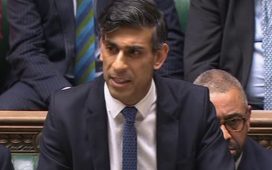In her book Wilful Blindness, Margaret Heffernan writes that we “mostly admit the information that makes us feel great about ourselves, while conveniently filtering whatever unsettles our fragile egos and most vital beliefs”.
In everyday life, this is often an impediment to sound decision-making. At the apex of politics, it is a psychological phenomenon that can inflict serious damage upon a nation. And in the case of the Brexit crisis, both main parties are now firmly in its toxic grip.
Jeremy Corbyn launched Labour’s European election campaign last week with a speech that presented Brexit less as a historic challenge than a hugely irritating distraction from his grand plan for Britain.
His purpose, indeed, was to set us all straight on this score. “Some people tend to look at the issue the wrong way around,” he said. “They tend to think the first question is leave or remain as if either is an end in itself. I think they’re wrong. The first question is what kind of society we want to be.”
For the misguided, he had a stern message: “We insist the real divide in our country is not how people voted in the EU referendum. The real divide is between the many and the few.”
Insist? That’s a strong word to use unless you’re sure of the evidence. And – unfortunately for Corbyn – the evidence does not support him.
Indeed, analysis published in January by the UK in a Changing Europe initiative at King’s College, London, showed that voters are now much more likely to define themselves with reference to the leave or remain causes than by party affiliation. Only one in 16 respondents did not have a “Brexit identity”, while more than one in five declared no party loyalty. Corbyn’s support for the “many versus the few” may resonate. But it is not, as he claims, the primary dividing line in our political culture.
The polarisation of the country between leave and remain is bad news. It is an intimation not only of what is politely called “realignment” – that is, the disintegration of the present party political system – but also of the potential degeneration of mainstream politics into an ugly culture war.
Though there is some blurring, the leave and remain causes are – for the most part – tribally distinct. The specific question of Britain’s departure from the EU has become a loose proxy for a whole range of issues: immigration, the impact of globalisation, identity politics, the dignity of labour, the meaning of internationalism, the tensions of pluralism, and so on.
Whether he likes it or not, this is the landscape that Corbyn faces as he seeks the highest office. It might suit him better if the politics of 2019 were defined overwhelmingly by a longing for his variety of democratic socialism. Plainly, they are not.
For this reason, his attempt to triangulate his way out of the Brexit dilemma is doomed to failure. What he presents as statesmanship looks (with good reason) like a strange combination of indecision and a stubborn ideological resistance to the facts. To govern is to choose: Corbyn’s conspicuous failure to choose on Brexit does not augur well for his prospective performance as prime minister.
As for the Conservatives; well, where to start? Their handling of the Brexit process has been an unmitigated disaster, consuming more than two years of parliamentary time and energy, leading to a place of impasse that is also a constitutional, economic and social minefield.
Having brought the rest of us to this lethal zone, their answer is the same as it is always is: to change their leader. One of the internal party legacies of the Thatcher era (which drew in turn upon Churchillian folklore) is the conviction that the most important variable is the identity of the person at the top. Though they brought her down in the end, the iron lady left her children addicted to the political crack cocaine of “strong leadership”.
Since William Hague rewrote the rules, it has been harder to depose the incumbent. In December, Theresa May survived a confidence vote by Tory MPs. Officially, another vote cannot be held now for seven months. But there are still plenty in her own party who – if she does not announce a definitive date for her departure – will continue agitating for a rule change, so that they can try to depose her again.
There is something truly grotesque about the unrestrained political beauty contest into which May’s most senior colleagues have now flung themselves. Fashion shoots, posed photographs with spouses, “My vision for Britain” articles: you would never think that the UK had been granted a second extension by the EU, or that May’s withdrawal agreement had failed three times, or that the cross-party talks must deliver soon or collapse.
Extraordinarily, most Tories see no contradiction or impropriety in this. So great is their faith in the power of leadership that they do believe that, say, Boris Johnson or Dominic Raab could do a better job in Brussels than May, and – by sheer force of charisma and personality – whip the EU into line.
This is the deep, collective delusion of a tribe that depends unhealthily upon the magical powers of its chieftain. It is no way to run a party, let alone a country.
Just when we need both parties to be rigorously focused, they have wandered off into the woods of distraction. For the voters there is no such handy exit hatch from the present crisis, no panic room to hide in. The Conservatives and Labour have gone awol. Is it any wonder that Nigel Farage looks so happy?
• Matthew d’Ancona is a Guardian columnist














